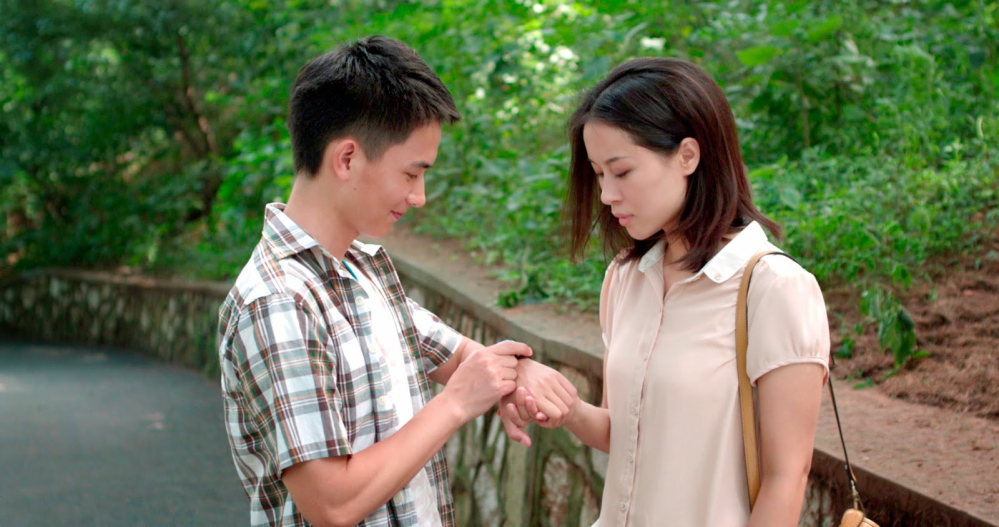Director Vivian Qu, a first-time director, may well have been a film student fan of 1940’s film noir. In her new “Trap Street,” she uses the streets of China’s mid-size city of Nanjing the way Chandler used Hollywood and Hammett used San Francisco: The dark rainy streets, the views of passersby seen through windshield wipers. Her two star-crossed lovers could have once been the couple in Don Siegel’s classic 1956 “Invasion of the Body Snatchers,” or the pair in Coppola’s 1974 “The Conversation,” a scent that floats faintly in the background of this film.
“Trap Street” could have been played out in any of those long ago cities. In all of them, paranoia is a player. Invisible big government figures lurk in the shadows like Harry Lime in his doorway in “The Third Man.”
We suspect from the title that something wicked may well be waiting in a doorway for us, but it starts out and floats like a romance. And knowing nothing of the story, we go with it.
Li Qiuming, (a talented Lu Yulai) may be what some would call happy-go-lucky. He’s young, embracing the street clothes of a teen skateboarder. His family is middle class, mother in the kitchen, father a magazine editor and small time party official.
Uneasy with his father, Li lives with a few friends in a tiny apartment in a rundown neighborhood. He’s a trainee for a large surveying company, spending his days traveling from spot to spot downloading data for digital maps, but has little interest in it. He prefers playing computer games with his roommates.
Li has a second part-time night job working for a company that installs and checks surveillance systems.
One day, surveying a site with his foreman, he discovers a Trap Street because it doesn’t come up on any of the city’s mapping computers and doesn’t show up on peoples’ GPS.
While at work, Li spots Guan Lifen, a young, well-dressed beautiful girl (Wenchao He) parking her new red car in a forbidden zone. They share a glance, and he is stunned, and for days she haunts his dreams.
Later, on a rainy night, Li and his co worker return to the area where she is coming from work, somewhere down the trap street that has no name.
They give her a ride to a subway station. Later, Li finds a small red box she has dropped in the car. He calls the number and arranges to meet her for coffee and return it. But a man shows up claiming to be her supervisor and retrieves the box.
But Li persists and one day, finally meets up with her, and charms the quiet girl, far above his class, with his innocence and sweetness. They start dating, going to bars and outdoor amusement parks and the city zoo.
At a party given by his friends, Li leaves her to get fresh drinks, and doesn’t return. He will appear elsewhere that night in different circumstances. Now we’re in Kafka country, in rooms without a view. There are no men in black hats and sunglasses here. Qu is too smart for that. The bad guys on the street, in the cafes, look like everyone else, like people with charming smiles who hold doors for you, people you would trust.
The state is a third party to the lovers. Cameras float above all the streets like silent birds sitting on wires, pretty birds who might sing at any time.
This is the future Qu tells us, and there is no where to hide, no where to run, because any street, at any time, could become a trap street.
“Trap Street” sometimes moves too slowly, and Qu shoots too many scenes that stand still much too long. But Qu, whose film took this year’s London Film Festival’s First Feature prize knows exactly where she is, and I would not be surprised to know that China’s leaders do as well.
Lu Yulai and actress Wenchao He are regulars in China’s independent film world, and clearly have bright futures.
J.P. Devine is a writer and former actor.
Send questions/comments to the editors.




Success. Please wait for the page to reload. If the page does not reload within 5 seconds, please refresh the page.
Enter your email and password to access comments.
Hi, to comment on stories you must . This profile is in addition to your subscription and website login.
Already have a commenting profile? .
Invalid username/password.
Please check your email to confirm and complete your registration.
Only subscribers are eligible to post comments. Please subscribe or login first for digital access. Here’s why.
Use the form below to reset your password. When you've submitted your account email, we will send an email with a reset code.